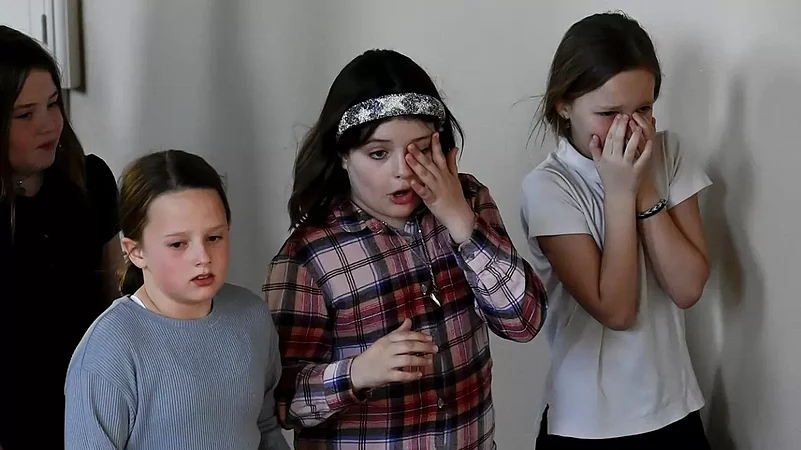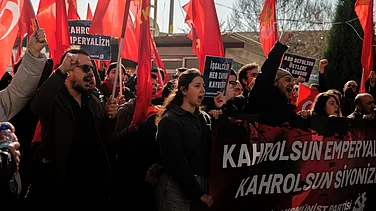Mass shooters have killed hundreds of people throughout US history in realms like stores, theatres and workplaces, but it is in schools and colleges where the carnage reverberates perhaps most keenly — places filled with children of tender ages, older students aspiring to new heights and the teachers planting the seeds of knowledge, their journeys all cut short.
If a mass shooting is defined as resulting in the death of four or more people, not including the perpetrator, 175 people have died in 15 such events connected to U.S. schools and colleges — from 1999′s Columbine High School massacre to Monday’s shooting in Nashville, Tennessee. The 28-year-old assailant, a former student of the school, was shot dead soon after the police arrived on the scene.
The rising number of mass shootings shows a troubling trend in the United States where federal and state governments are struggling with gun violence. As shootings take place even in states with stricter gun laws, lawmakers also wonder about the roots of such incidents.
Here we explain the extent of gun violence in the USA, why guns are so hotly debated, and what the experts say on the subject.
Constitutional protection to gun ownership
The first point highlighted in the discussion on US gun violence is the easy access to guns.
Though different states have different laws on guns in the United States, the US Constitution broadly provides the right to bear arms to US citizens. Owning guns is therefore protected by the US Constitution.
"A well regulated Militia, being necessary to the security of a free State, the right of the people to keep and bear Arms, shall not be infringed," says the 2nd Amendment of the US Constitution.
In a landmark 2008 ruling, the US Supreme Court held that "prohibition against rendering any lawful firearm in the home operable for the purpose of immediate self-defense" is unconstitutional.
It is understood that the idea behind the 2nd amendment was to prevent the state from becoming a tyrant. In such a case, the 2nd amendment would allow citizens to organise into militias and resist state's tyranny. However, it now means the general right to bear arms and often serves as an opposition tool against regulation of guns.
"The right to 'keep and bear Arms' was thus included as a means to accomplish the objective of a 'well regulated Militia'—to provide for the defense of the nation, to provide a well-trained and disciplined force to check federal tyranny, and to bring constitutional balance by distributing the power of the sword equally among the people, the states, and the federal government," notes The Britannica Encyclopaedia.
The gun debates in USA
The first reason highlighted is often the availability of guns. But then it's the humans and not guns that kill people. This leads to a hot argument.
One side believes that access of certain class of people, such as mentally unstable and racist persons, leads to shootings. The second side says that if these people simply don't have access to guns, they cannot simply shoot people dead. This argument is countered by saying that a person who wants to kill will find a way to kill anyway, such as stabbing or running people over by cars.
But there is some sense in the second side's argument. While an automatic gun can kill, say 25 people, a stabbing or some other medium might not cause so many deaths.
The second reason is the prevalent gun culture in the United States. Several states and communities have historic gun-ownership traditions. Particularly Republicans are pro-guns whereas Democrats are for regulation or outright ban. This has polarised the United States just like the issue of abortion and reproductive rights.
The Democrats are also criticised for a poor record of controlling crime in cities. The Democrat-run cities have higher crime rates.
"Surprisingly, among the 20 most populated cities, only the average robbery rate is significantly higher in cities with a Democratic mayor. Among cities in the next two highest populated groups, murder, robbery, and aggravated assault rates are statistically higher in cities Democrats control. And, when all 100 of America’s largest cities are grouped together, all violent crime rates (with the exception of rape) are significantly higher in cities with Democratic mayors," finds a study conducted by Middlebury College, Vermont.
In this backdrop, the Republicans portray private gun ownership as a means to fight crime.
Reasons for gun crimes, solutions proposed
There are broadly three main causes of gun violence, which are its availability, mental health issues with gun-owners, and societal and racial tensions, according to an article by Prof. David Hemenway of Harvard Injury Control Research Center.
Hemenway flags that there is not enough research on gun violence and we still don't know for sure what causes it, but we have a broad idea what causes more gun violence, such as guns in homes and mental health issues.
He writes, "We know that a gun in the house increases the risk of suicide—the scientific evidence is overwhelming. We know that a gun in the home increases the risk that someone in the home will be accidentally shot. And a number of studies very persuasively show that guns increase the risk of a woman in the house being murdered. That makes sense, because women usually are murdered in the home, and they’re often murdered by their husband’s or their lover’s or their ex-lover’s gun—it’s the man’s gun almost always.
"There’s no question that if there were no mental health problems, if no one had anger or alcohol problems, we’d have less violence. If we had less poverty and inequality, we’d have less violence. If we didn’t have racial tensions, we’d have less violence. If we had better education and better parenting, we’d have less violence. But the fact is, we also have a gun problem."
Better background checks are suggested to see that only decent people can buy guns, not those with criminal accusations or with mental health issues or racist tendencies. The American Psychological Association (APA) in a study noted that violent history is key to such checks.
"Although many youths desist in aggressive and antisocial behavior during late adolescence, others are disproportionately at risk for becoming involved in or otherwise affected by gun violence. The most consistent and powerful predictor of future violence is a history of violent behavior," says APA in a study on predicting and preventing gun violence.
The APA also noted mental health reasons for gun violence.
The APA study said, "Although it is important to recognise that most people suffering from a mental illness are not dangerous, for those persons at risk for violence due to mental illness, suicidal thoughts, or feelings of desperation, mental health treatment can often prevent gun violence...Additionally, it should be noted that behavioral threat assessment is becoming a standard of care for preventing violence in schools, colleges, and the workplace and against government and other public officials."
The APA also noted that "high-risk" groups should not be allowed to own guns as they have more chances of causing gun violence.
The APA study said, "Firearm prohibitions for high-risk groups — domestic violence offenders, persons convicted of violent misdemeanor crimes, and individuals with mental illness who have been adjudicated as being a threat to themselves or to others — have been shown to reduce violence.
"The licensing of handgun purchasers, background check requirements for all gun sales, and close oversight of retail gun sellers can reduce the diversion of guns to criminals."
(With AP inputs)


























